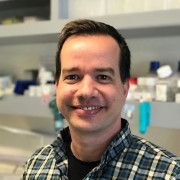Roth TL, Li PJ, Blaeschke F, Nies JF, Apathy R, Mowery C, Yu R, Nguyen MLT, Lee Y, Truong A, Hiatt J, Wu D, Nguyen DN, Goodman D, Bluestone JA, Ye CJ, Roybal K, Shifrut E, Marson A. Pooled Knockin Targeting for Genome Engineering of Cellular Immunotherapies. Cell. 181(3):728-744.e21. (2020)
https://doi.org/10.1016/j.cell.2020.03.039
Cortez J^, Montauti E^, Shifrut E, Zhang Y, Shaked O, Xu Y, Simeonov D, Zhang Y, Roth T, Chen S, Vogel I, Prator G, Zhang B, Lee Y, Sun Z, Ifergan I, Van Gool F, Bluestone J, Fang D*, Marson A*. CRISPR Screen in Regulatory T Cells Reveals Ubiquitination Modulators of Foxp3. Nature. 582(7812):416-420. (2020) https://doi.org/10.1038/s41586-020-2246-4
Shifrut, E.^, Carnevale, J.^, Tobin, V., Roth, T. L., Woo, J. M., Bui, C., Li, P. J., Diolaiti, M., Ashworth, A., Marson, A*. Genome-wide CRISPR Screens in Primary Human T Cells Reveal Key Regulators of Immune Function. Cell 175, 1958–1971.e15 (2018). https://doi.org/10.1016/j.cell.2018.10.024
Madi, A.^, Shifrut, E.^, Reich-Zeliger, S., Gal, H., Best, K., Ndifon, W., Chain, B., Cohen, I. R., Friedman, N. T-cell receptor repertoires share a restricted set of public and abundant CDR3 sequences that are associated with self-related immunity. Genome Res. 24, 1603–1612 (2014). https://doi.org/10.1101/gr.170753.113



